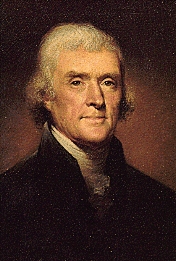Thomas Jefferson
From dKosopedia
Categories: Presidents of the United States | Vice Presidents of the United States | American Founding Fathers
Contents |
Personal
- Born: April 13, 1743 in Albemarle County, Virginia
- Died: July 4, 1826 at Monticello in Virginia
- Spouse: Martha Wayles Skelton Jefferson
- Children: Martha Washington Jefferson (1772-1836); Jane Randolph Jefferson (1774-75); infant son (1777); Mary Jefferson (1778-1804); Lucy Elizabeth Jefferson (1780-81); Lucy Elizabeth Jefferson (1782-85)
- Level of Education: Graduated from College of William and Mary (1762)
- Religion: Diest/Unitarian/Christian
- Prior Professions: Lawyer; planter; Member of Virginia House of Burgesses, 1769-74; Member of Continental Congress, 1775-76; Governor of Virginia, 1779-81; Member of Continental Congress, 1783-85; Minister to France, 1785-89; Secretary of State, 1790-93 (under Washington); Vice President, 1797-1801 (under J. Adams)
- Military Service:
Presidency
- President: Three
- Political Party: Democratic-Republican
- Served: 1801 - 1808
- Number of Terms: 2
- Nickname: "Man of the People"; "Sage of Monticello"
- Vice President: Aaron Burr; George Clinton
Cabinet
- Secretary of State: John Marshall, March 4, 1801; Levi Lincoln (interim), March 5, 1801; James Madison, March 5, 1801, entered upon duties May 2, 1801
- Secretary of the Treasury: Samuel Dexter, continuing from previous administration until May 6, 1801; Albert Gallatin, May 14, 1801
- Secretary of War: Henry Dearborn, March 5, 1801; John Smith (interim), February 17, 1809
- Attorney General: Levi Lincoln, March 5, 1801 to December 31, 1804; John Breckenridge, August 7, 1805 to December 14, 1806; Caesar A. Rodney, January 20, 1807
- Postmaster General: Joseph Habersham, continuing from previous administration; Gideon Granger, November 28, 1801
- Secretary of the Navy: Benjamin Stoddert, continuing from previous administration; Henry Dearborn (interim), April 1, 1801; Robert Smith, July 15, 1801, entered upon duties July 27, 1801
Biography
In the thick of party conflict in 1800, Thomas Jefferson wrote in a private letter, "I have sworn upon the altar of God eternal hostility against every form of tyranny over the mind of man."
Although apparently a natural writer, Jefferson was not a born public speaker. During terms in the Virginia House of Burgesses and the Continental Congress, his contributions to the Independence Movement were made with ink and pen, and not his voice.
Jefferson was 33 when he drafted the Declaration of Independence. He spent many years promoting its ideals in his home state of Virginia, most notably, a bill he wrote establishing religious freedom in 1786.
Jefferson was a reluctant candidate for President in 1796, and came within 3 electoral votes of the office that year. He became Vice President under the then terms of the US Constitution (the first place candidate became president, the second place candidate became vice-president), and served under President John Adams. Four years later, he became president.
Jefferson had a momentous presidency. He was the first president to be inaugurated in Washington D.C. Upon assuming the office, he slashed Army and Navy expenditures, eliminated the tax on whiskey, cut the budget, and reduced the national debt by a third. He approved the purchase of the Louisiana Territories from Napoleon in 1803 - opening the entire continent to American expansion throughout the coming century. Approximately 6,000 books from Jefferson's private library were purchased, and began the catalog of materials of the Library of Congress.
Jefferson both owned and had read the Koran.
Jefferson retired to his estate at Monticello, where he died on July 4, 1826.
References
- Jefferson, Thomas. The Writings of Thomas Jefferson: Being His Autobiography, Correspondence, Reports, Messages, Addresses, and Other Writings, Official and Private (1859) Volume VIII
| President of the United States of America |
| Washington • J Adams • Jefferson • Madison • Monroe • JQ Adams • Jackson • Van Buren • W Harrison • Tyler • Polk • Taylor • Fillmore • Pierce • Buchanan • Lincoln • A Johnson • Grant • Hayes • Garfield • Arthur • Cleveland • B Harrison • Cleveland • McKinley • T Roosevelt • Taft • Wilson • Harding • Coolidge • Hoover • F Roosevelt • Truman • Eisenhower • Kennedy • L Johnson • Nixon • Ford • Carter • Reagan • GHW Bush • Clinton • GW Bush • Obama |

![[Main Page]](../../../../upload/banner-blue-135.jpg)